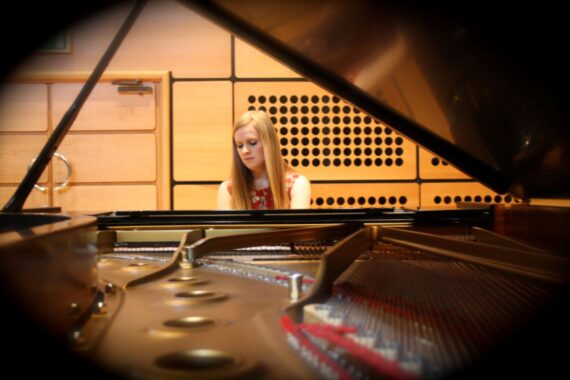Illuminate Women’s Music: Celebrating composers from across the ages

On 8th March, we celebrate International Women’s Day with a vibrant concert by Illuminate Women’s Music. This inspiring project champions the creativity of women as both composers and performers, highlighting commissioned works from early-career female composers alongside historical pieces that highlight the rich legacy of women in music.
We spoke to Illuminate’s Artistic Director Angela Slater to gain some insight into her vision for the project, and how work like this is changing the narrative for women in music.
Can you tell us about your music practice?
As a composer, I have always been fascinated in the dialogues between science, visual arts, dance, and politics. I have endless curiosity for gestures, shapes, sounds and their relation to the world, and how these relate to other artforms. My works are often inspired by the natural world, visual arts, particularly colour theory and dance, where I have engaged with Laban’s ‘Eight Efforts’ dance theory.
When composing, I find engaging with extra-musical sources — whether this be visual art, poetry, the natural world, or a scientific concept — to be an extremely useful way to stimulate and structure my composition thoughts in the writing process. This helps bring another way of expressing form, colour and texture that I can then simultaneously conceptualise into composition.
You founded Illuminate in 2017. What is the mission of this initiative, and why is it important?
The Illuminate project had been forming in my mind long before 2017. Whenever I was at a composition course, I was usually the only woman or, if I was lucky, one of two. I started to think back to my education — both at school and university — and could not recall anyone introducing female composers to me.
When I did some research into this, I found it to be largely true, although I was glad to discover I had encountered some female composers through my flute grades, but these composers were usually labelled as either a ‘jazz composer’ or ‘educational composer.’ I thought it was interesting that these women had to be qualified with an additional label other than ‘composer’. This really concerned me personally, but also generally for the representation and respect of all female creativity; as Betty Atterbury put it, ‘Omission is a powerful teacher.’
As a composer in my PhD, I was fascinated by incorporating the natural world into different parameters of my compositions. Through this, I increasingly encountered more female composers and their works. I quickly realised that I had started to form a type of ‘personal canon’ of women. This made me wonder about the place of female composers in the established canon, the cycle of cultural reproduction the canon leads to, and how we can truly have an impact on this.
The idea for Illuminate started as a plan to host a couple of concerts that had all-female programmes. However, I soon realised I wanted to reach more people, introducing new repertoire for the audience to add to their own personal canons. Most concert-going audiences, by their own admission, know little about women’s music, or that it even exists. By programming both historical and living female composers side by side, I hoped to create a forum to celebrate creative women from across the ages. In the long term, I would like works by women to be considered as equal to established works whose places are safe in concert programmes.
It was important then, and continues to be today, as the representation of female composers in programming and commissioning is still not equal. At best representing a third of commissioned works at major festivals, but also more often not being shorter works than male colleagues. There has been some progress but there is still a long way to go in education, existing repertoire, and new works.
Your composition Dreams features in this concert. What is the story behind this piece?
This work came about through my connection with the violinist Maja Horvat. Having come into contact with her originally a number of years ago after curating a concert at The Royal College of Music for Illuminate, her the Brompton String Quartet went on to perform my string quartet Eye o da hurricane in a number of performances. Indeed, the Brompton Quartet went on to perform several Illuminate concerts as well, including giving the UK premiere of my work Falling watercolours.
The vitality, expressive range and drama of Maja’s playing completely drew me in as a listener and astonished me as a composer; to think of all the possibilities with a performer, a musician like this. Maja also found my writing for violin naturally lent itself to her idiosyncrasies as a player, allowing her to flourish. Soon we began talking about her performing one of my solo works for violin and even a new piece.
It was at the tail end of 2023 that we managed to gain funding from the Marchus Trust to allow me to begin work on this twenty-minute work, with Maja collaborating with pianist Joesph Havlat. Jo is an amazing pianist whom I have met a couple of times over the years at Dartington and Aldeburgh. He is the type of player that does not seem phased by anything you throw at him!
This piece came after a year in which a number of my pieces dealt with text, memory and dream space with works such as A tulip iron and A gift for control. After my trip to the US visiting Santa Fe for the performance of my work Where skies aflame for string quartet and coming home via Boston, I had the chance to revisit Harvard’s wonderful Grolier Poetry Book Shop.
Among other books I bought was Mary Oliver’s Dream Work Collection. For me, her poem Dreams had a narrative where darkness and light, fear and hope, stillness, motion and energy are all intertwined. It is with these thoughts in mind I drew inspiration from her poem Dreams using its imagery and form as the basis for the intentionality of the work and its architectural structure.
Stoller Hall sits within Chetham’s School of Music, which is home to over 300 of the world’s brightest young musicians. What advice would you give to young women and girls at the start of their musical journey?
For young women and girls commencing their musical journey, it is essential to have faith in your abilities and persevere despite any gender-related obstacles you may face. Approach your passion with determination, curiosity, and openness. Building a network and seeking mentorship opportunities can significantly contribute to a successful career.
- Embrace a broad range of music: explore various genres and styles, discovering your preferences and the reasons behind them.
- Think critically: when learning music history or different genres, maintain a questioning mindset and recognize that there is always more to explore beyond the standard canon.
- Try various roles: do not limit yourself early on; seize opportunities to conduct, perform, compose, or organize concerts to broaden your horizons.
- Attempt composing: Even if you do not identify as a composer, try it. You might discover a hidden talent, or at the very least, develop a greater appreciation for the art.
- Network broadly: connect with professionals and peers, forming groups, and practicing conducting or composing together.
Finally, what do you hope audiences take away after seeing this performance?
I hope audiences leave the performance feeling inspired and moved by the incredible talent of the female composers and musicians featured in the concert. I want them to see the value in supporting and celebrating diversity within the music industry, and to realise that by doing so, we can all benefit from a richer, more vibrant musical landscape. I also want them to have the opportunity to hear Maja and Jo’s exceptional virtuosity.
Illuminate Women’s Music takes place on 8 March at 7:30pm at Stoller Hall and promises to be an enchanting performance including works by Lili Boulanger and Grazyna Bacewicz.

